HDC at AUCD 2022
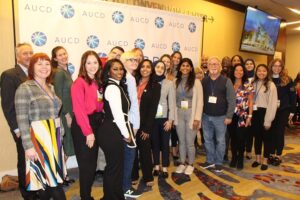
Health Equity, Serving the Whole Person
Key points in plain language
Here is a brief description of big ideas coming up in this article.
HDC went to the AUCD Conference in Washington, D.C. last November.
HDC is a University Center for Excellence in Developmental Disabilities (UCEDD).
A UCEDD is a part of the Association of University Centers on Disabilities (AUCD).
The AUCD Network is made up of university centers across the United States.
The university centers work across a lot of different fields to improve life for people with disabilities.
As a University Center of Excellence in Developmental Disabilities (UCEDD), the Human Development Center is a part of the Association of University Centers on Disability (AUCD). The AUCD network members meet annually at a conference in Washington, D.C. to connect with fellow members, scholars, and professionals. Each year, HDC staff and scholars from our interdisciplinary training programs, the Leadership Education in Neurodevelopmental and Related Disabilities (LEND) and Interprofessional Perpetration for Related Services Personnel (IPP) attend the conference. The theme for 2022 was all about Health Equity and how we can ensure that all people have equal access to healthcare.
Below are highlights from HDC’s participation in the AUCD conference, which includes two poster presentations, and the major takeaways from Louisiana LEND scholars.
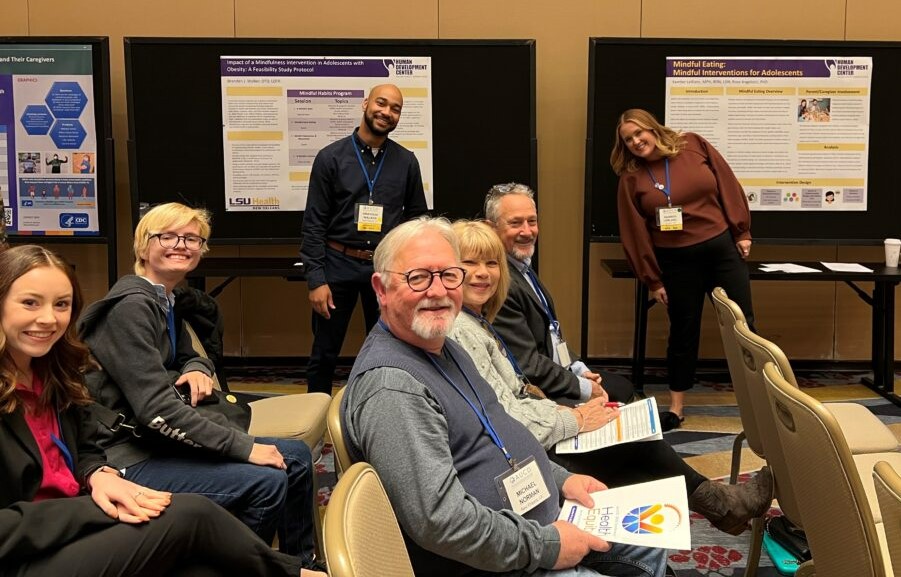
HDC posters
Key points in plain language
Here is a brief description of big ideas coming up in this article.
HDC had two posters at the AUCD conference this year.
Dr. Brandon Walker had a poster at AUCD. He is a LEND faculty member. His poster was about a community program that can help a person create healthy habits.
Kamber LeBlanc also had a poster at AUCD. She was a LEND scholar in 2022. Her poster was about helping people with disabilities learn how to think about food in healthy ways.
LEND faculty Brandon Walker, OTD, LOTR and 2022 LEND scholar Kamber LeBlanc, MPH, RDN, LDN presented posters about health and wellness.
Brandon’s poster Impact of a Mindfulness Intervention on Adolescents with Obesity: A Feasibility Study Protocol is about community-based programs that can impact an individual’s habits and routines. His poster evaluates the feasibility of implementing Mindful Habits, a four-week mindfulness program for adolescents with obesity.
Kamber’s poster Mindful Eating: Mindful Interventions for Adolescents brings to light issues individuals with disabilities face with access to mindful eating and nutrition practices. She hopes to combat this exclusion of individuals with disabilities through a 4-week mindful eating based curriculum developed for adolescents with Down syndrome.
Louisiana LEND scholars at AUCD
Key points in plain language
Here is a brief description of big ideas coming up in this article.
LEND scholars complete a scavenger hunt at the AUCD conference each year. A scavenger hunt is a game to find a list of things.
The scavenger hunt asked the scholars to do things like make a new friend, meet self-advocates, attend meetings, find a Ginkgo leave in the city, and more fun activities.
Each year, Louisiana LEND scholars undergo an AUCD scavenger hunt. Organized by LEND Coordinator Nadia Johnson, LOTR, the scavenger hunt covers networking, session inspiration, and adventures through Washington, D.C. The following are conference takeaways from LEND scholars, as submitted in their scavenger hunt presentations.
A major takeaway from the Opening Plenary
Titled Achieving Equity: Access to Health and Community for All, this plenary asked, “How do we ensure that all people have equal access to health? It’s more than just health care. From housing to meaningful employment, to access to vaccination sites and a safe trip to the grocery store, people with disabilities and their families experience daily disruptions and are often marginalized when it comes to accessing a broad array of needed services. We look forward to exploring health equity, the social determinants of health, and the steps needed to ensure that every person is provided with the best opportunities possible.”
LEND scholar and doctoral student in school psychology Svetha Mohan was struck by the conversation around doctors admitting they don’t want patients with disabilities. She says, “A huge takeaway that I got from this piece of the plenary was that, of course, ableism is systematic. I walked away with a lot more knowledge about the history of healthcare for people with disabilities, but also what is being done currently when they talked about the 5 components of health equity plan.”
Attend a Special Interest Group (SIG)
LEND scholar and future dentist Jyoti Prajapati attended the Sexual Health SIG and reports on the SIG’s three goals:
- Ensuring that all children and youth with intellectual and developmental disabilities have access to age-appropriate sex education (including recognizing and preventing harm and abuse) equally to what is offered to children without disabilities
- Ensuring that all direct support professionals are trained to implement safeguards designed to identify signs of and prevent sexual assault and abuse
- Improving systems where individuals can report suspected instances of assault, abuse, or neglect, and receive prompt follow up from professionals trained to investigate these allegations in an effective manner
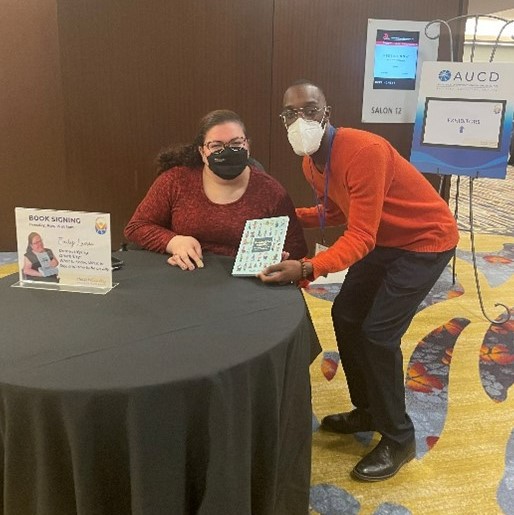
Take a photo with a new friend
LEND self-advocate mentor in training Will Johnson met his role model Emily Ladau after her session The Power of Sharing Your Story. Will says, “She’s a Great Self-Advocate and A wonderful Author. She spoke about her rights and how she got where she at now. She’s my inspiration as I am sitting there. I took some notes that reflect how I need to work on some things in my Advocacy.”
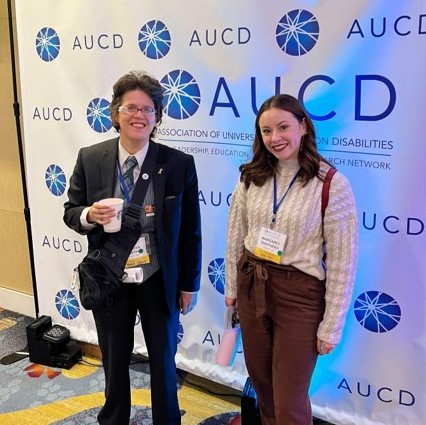
LEND scholar and second-year master of occupational therapy student Margaret Shepard met self-advocate and UW LEND Advocate Faculty member Ivanova Smith. They met after an FASD session.
Identify a piece of legislation that is getting attention at the conference
LEND Scholar and future speech-language therapist Maddie Mayes reported on three pieces of legislation:
- The EARN Act→ if passed, ABLE account eligibility would expand the age of onset of disability from before age 26 to before age 46 which would expand the total pool of eligible participants from 8 million to 14 million people
- Direct Care Opportunity Act→ Direct care workers provide daily assistance to millions of older Americans, people with disabilities, and others with chronic care needs. And so this act would direct the Department of Labor to award grants to eligible entities to develop and carry out projects to recruit, retain, or provide advancement opportunities to direct care workers.
- Transformation to Competitive Integrated Employment Act (TCIEA) → lift up workers with disabilities and raise wages for people being paid subminimum wage
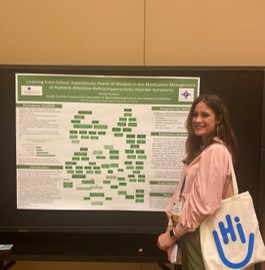
Take a picture with your favorite poster presentation
LEND scholar and occupational therapy student Alanna Hoffpauir found a poster from South Carolina LEND scholar Jordyn Sutton to be her favorite. Titled Learning from Others’ Experiences: Pearls of Wisdom in the Medication Management of Pediatric Attention-Deficit/Hyperactivity Disorder Symptoms displays a “pearls of wisdom” flowchart of considerations in choosing medications and other interventions for children with ADHD and other comorbidities based upon shadowing and consultation with a Developmental-Behavioral Pediatrician.
Alanna said, “This poster is a decision tree for options related to medication management of pediatric ADHD symptoms. I really liked it because it took into consideration ALL factors, including SES status, genetic history, and patient history. It provided a very holistic perspective, which I appreciated.”
Other takeaways
LEND scholar and PhD student in school psychology Renee LaMoreau found that we need more supports for family members, especially Black and Brown families, of children with disabilities. She says, “It’s important to create spaces of support in which food and childcare are provided and members feel a sense of shared ownership.”
LEND scholar and family advocate Christina Martin learned how a multitude of work goes into healthcare, accessibility, advocating, and more. She says, “I am beyond amazed at how many different initiatives play a part into the integration of accessibility and meeting the needs of all individuals with disabilities to be comfortable everywhere they live, work, learn, and play.”
About key points in plain language
The purple boxes were written by HDC’s Plain Language Task Force.
They help make news and information easier to understand.
Do you have ideas that can help HDC? Email Jolie at jrob44@lsuhsc.edu.

 myLSUHSC
myLSUHSC